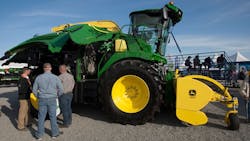Google Backs Farm-Focused Startup as 'AgTech' Blooms
Google on Tuesday pumped $15 million into a farming-focused technology startup, the latest in a surge of investment applying Internet innovations to growing food.
The funding round led by Google's investment arm brings to nearly $28 million the total amount of money pumped into Farmers Business Network (FBN) by backers including powerhouse Silicon Valley venture capital firm Kleiner Perkins Caufield & Byers.
"Farmers are quintessential entrepreneurs; they are on their own and are mechanics, hackers, managers, animal specialists and more," FBN co-founder Charles Baron told AFP.
"Agriculture has always seen lots of innovation. What you are seeing more of now is venture-backed companies pushing into agriculture."
Silicon Valley-based FBN is part of a flourishing sector known as agricultural technology, or "AgTech' for short.
FBN is a platform that lets farmers pool and share data gathered from arrays of sensors and computers involved with tilling the soil.
Data is analyzed by computers in the Internet cloud to extract insights on anything from which seeds grow best in which soil to optimizing irrigation tactics or anticipating weather patterns, according to Baron.
"FBN connects the world's farmers together and allows them to share knowledge to farm better," Baron said.
Tech-powered harvests
Modern farming has grown technologically advanced, with sensors and computing chips woven into operations and equipment, according to FBN. For example, tractors dispensing seed or fertilizer are typically self-guided using GPS mapping.
FBN helps farmers put such data to work in plans for handling fields, and to see for themselves which seeds or fertilizers meet their needs instead of relying on marketing pitches from sellers.
"We allow them to consult with each other about optimizing products," Baron said. "Now, a single farmer has access to more information than they ever had."
FBN launched last year and has spread to farms in 17 states. Annual membership to FBN costs each farmer $500.
"Farmers have been advising each other for generations; farmers get together at diners, coffee shops, co-ops, grain elevators," Baron said.
"FBN taking that anecdotal conversation and backing it with data and putting it in a usable format online."
About $2.36 billion in venture capital was pumped in AgTech last year, compared to $2.1 billion investors poured into clean tech, according to Rob Leclerc, co-founder of AgFunder.com, a marketplace for AgTech investment.
A little over a billion dollars was invested in AgTech in the first three months of this year, he added.
AgFunder credited the acquisition of farming data science company Climate Corp in late 2013 by Monsanto for about a billion dollars with waking investors to the sector.
Advances in drones, robotics, and the flourishing "Internet of Things" where traditionally dumb objects are being made smart with sensors and computing power have helped innovations to take root in farming, according to Leclerc.
Add into the mix cloud computing that lets rich analytics be handed quickly by data centers online and then pushed back to farmers' smartphones.
"It is a confluence of technologies that have reached a level of maturity and sophistication, and venture capitalists looking for growth opportunities outside the traditional tech industry," Leclerc said.
"A lot of what they were working on was in the consumer space, now they are looking for other domains where it can be applied."
Feed the world
The agriculture market is a multi-trillion-dollar behemoth, and also fits into social mindsets of some investors by involving ways to feed the world's growing population.
The AgTech sector includes bio-plastics, biofuels, fish farming, genomics, getting fresh produce to shops without spoiling and ways to use food waste.
Billionaires Bill Gates and Li Ka-Shing have backed Hampton Creek Foods, a San Francisco firm specializing in going directly to plants for egg substitutes used in comestibles such as mayonnaise and cookies.
Farmers are also being called on to produce more food on decreasing amounts of farm land, according to Baron, who left an energy technology job at Google in 2011.
"I think information is the next big age for agriculture," Baron said.
"It is about farming smarter."
Copyright Agence France-Presse, 2015
About the Author
Agence France-Presse
Copyright Agence France-Presse, 2002-2025. AFP text, photos, graphics and logos shall not be reproduced, published, broadcast, rewritten for broadcast or publication or redistributed directly or indirectly in any medium. AFP shall not be held liable for any delays, inaccuracies, errors or omissions in any AFP content, or for any actions taken in consequence.
